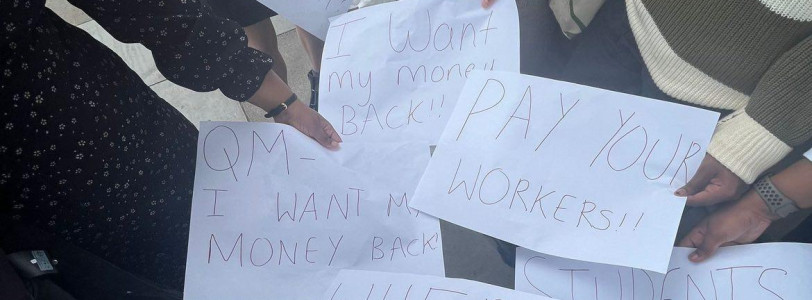On 1 August, the University and College Union (UCU) tweeted that talks have broken down between them and the Universities and Colleges Employers Association (the UCEA).
120,000 academics, lecturers, and those in administrative positions such as librarians within universities and colleges are represented by the UCU, which this week tweeted that talks had broken down with the UCEA, prolonging industrial action.
The UCEA represents universities and colleges in national negotiations with the five sector trade unions, government bodies, funding councils and other stakeholders, and has rejected the UCU’s key demand that pay deductions for going on strike and taking part in the Marking and Assessment Boycott (MAB) this year are removed. The UCU have tweeted that the boycott will therefore continue, as a resolution has not been reached, and that they are ‘preparing the ground for legal action’.
They went on to tweet that the Higher Education Committee will meet in early September to set the dates for a national ballot of every university in the UK for further industrial action.
The UCEA argued in a letter written on 31 July to Jo Grady, the General Secretary of the UCU, that ‘HEIs [Higher Education Institutions] have been focused on the impact of the boycott on students’, once again placing the blame for another round of failed negotiations onto the UCU.
The UCEA could agree a resolution to the dispute and end its impact on students today, if they wanted to, but they do not want to concede to the UCU’s demands. These include:
· The removal of punitive deductions for taking part in industrial action
· A pay rise that is in line with the rising cost of living
· Manageable workloads for staff
· Closing gender and ethnicity pay gaps
· An end to casualisation of staff contracts
· Student-staff ratios that mean staff are able to support all of their students sufficiently
The UCEA have continued to insist on deducting pay from staff since the beginning of the boycott on 20 April. That’s over 100 days of deductions now for staff who have been working full-time, except on strike days, doing all of their usual duties aside from marking assessments. Imagine working full-time for that length of time and being unsure how much pay you are actually going to receive at the end of the month.
The MAB is ‘Action Short of a Strike’ (ASOS), which includes working to contract and not covering for absent colleagues. As this is working to contract, pay should not be affected, yet a policy of 100% pay deductions for ASOS is being imposed by the UCEA. So if staff taking part in the MAB work the hours their contract outlines, they still don’t get paid. The UCEA wrote in their letter that pay will be ‘deducted on a phased basis to ease the financial impact on UCU members who have participated in the MAB’.
As for students, the UCEA’s decision means that we will continue to wait for our final marks. Some will have graduations where they receive a blank piece of paper, the ceremony essentially to maintain the idea that everything is continuing as normal. Others don’t know when they will receive the marks they need in order to graduate, as the boycott continues indefinitely.
I’m part of the third year English Literature cohort at Queen Mary. We have an “English 2020” Whatsapp group chat, and students are sharing how they are coming to terms with perhaps having to defer their Masters, PGCE and graduate programmes. The universities that have accepted their initial applications have said that they need to know their grades to be admitted onto these courses. Or, they can be admitted, but if it turns out that they received a lower grade than their provisional one they will be deregistered. International students are facing uncertainty about whether they will be able to apply for a visa to remain in the UK to continue their studies.
And it’s not just finalists who are affected, but first and second year students too. I spoke recently to a second year English student at Queen Mary who was not sure if he will be able to progress into his third year. He has signed a lease to live in university accommodation for another year, and told me that without student loan payments he cannot afford to stay there.
The situation is not something outside of management’s control
Some universities, such as King's College London, have gotten around the marking boycott by awarding students a final module grade on the basis of earlier assessments. Often these assessments are weighted less, and therefore students may have not prioritised them as much as they would have if they knew they would decide their entire module grade. This reminds me of how A-Level students in 2020, the cohort who are finalists now, had their final grades decided on the basis of their mock exams. Unlike COVID, this situation is not outside of university management’s control, and we cannot allow them to think that they can get away with this level of disregard for the students and staff that make up universities.
The UCU has shown that management do have the money to provide pay rises for staff that is in line with inflation. They argue that the surplus the sector generated last year could raise pay by 10% and still leave hundreds of millions of pounds spare. Looking at the statistics for Queen Mary’s 2022 financial year, it is hard to understand why the UCEA says that universities can’t afford to give their staff a pay rise. The surplus generated in 2022 was 99 million pounds. They also made £354 million in tuition fees and educational contracts, but that’s another conversation. In more positive news, the UCU and UCEA have agreed that an independent review of where the sector’s finances are going is needed. Even if universities really do not have the money to provide pay rises, the UCEA should then be actively finding ways to generate that money, such as lobbying the government for a better funding model.
The UCU voted for the Marking and Assessment Boycott as they believed that if the ‘degree certificate factory’ was threatened, with degree classifications and graduations delayed, this would put more pressure on management to resolve the dispute. However, universities are still doing everything they can to ensure that graduations go forward as normal, even if it means students “graduate” without degrees.
I think this completely devalues the work that lecturers do, both teaching and marking, in an attempt to mitigate the boycott’s impact. It means that students lose out on getting specialised feedback on their work from their lecturers. Senior Management are pressuring members of faculty who are not striking to mark work that striking lecturers won’t, causing division within departments. Instead of paying their staff fairly, they bring in temporary workers from other universities. Replacement markers’ rushed feedback is not what students signed up for.
I think that it is also important to think about the material impact that management’s resistance to resolving this dispute is having on what it is like to work and study at university. Thinking back to the atmosphere at my university during my last semester, it was not good at all. Staff were extremely anxious about docked pay, and students were disappointed about having to miss weeks of classes. I believe that if the UCEA decides to implement the UCU’s demands, student and staff’s experience of university will be so much better. Imagine a year with no strikes!
An interview with a member of Queen Mary’s UCU, Sita Balani
I spoke to Sita Balani, who kindly agreed to an interview about the MAB and working conditions at Queen Mary.
What are your reasons for participating in the MAB and the strikes this year?
For me, the main reason is workload and working conditions. Spiralling workloads and decreasing ratios of staff to students prevent us from giving students the kind of attention we want to give, and which we used to be able to provide. I’ve seen so many colleagues get sick from overwork, and so many people I’ve studied and worked with go from precarious contract to precarious contract. Less and less money goes into paying academic staff, and we’re seeing the effects of this in every aspect of higher education. Management keep scrapping academic standards to try to push degrees through and it’s yet another way we see their contempt for education. Industrial action is an attempt to get fair pay and conditions for educators, and in doing so improve the conditions for students.
Have there been any positives to the experience of striking, such as being on the picket lines with other striking members of staff, and the sense of unity created through that?
Absolutely! The picket lines are friendly, energetic, interesting — we talk about ideas, get to know colleagues and students from other departments, hold teach outs, read poems, sing, dance.
I imagine it must have been really hard to continue a strike or a boycott during a cost of living crisis, and when Queen Mary’s Principal Colin Bailey is not paying staff because of the work that they have not “made up” while on strike. How have the punitive pay deductions impacted you?
It’s been a huge worry all year. Seeing my latest payslip was a real slap in the face. I’m in the relatively stable position of having a full time job, but for colleagues on part-time or fixed term contracts, the situation is already precarious, and deductions make it much more so. QM’s punitive approach to staff taking industrial action – threatening to take 100% pay – is divisive and potentially illegal.
I have been reading that many have resigned from teaching, or have dropped out of PhD’s because of the toxic culture within HE, and not being paid enough to continue. Have you seen that happen at Queen Mary? Have you yourself thought about leaving?
I’m relatively new to QM but even in a year, I’ve seen people leave, and it’s definitely happening across the sector.
Have you been involved in the dispute from its beginning, in 2018?
This dispute has been going on for my entire academic career! Other than a one-year pause during the pandemic (2020-2021), I’ve never seen a full working year without strike action. The intransigence of management has been hugely disruptive to my working life, both because working conditions continue to deteriorate and because these conditions make industrial action our only option.
Actions that students can take to put pressure on university management
I pulled these bullet points from the Queen Mary UCU website and made them more general - I’m sure your university’s UCU branch will have an equivalent!
Speak to other students on your School Whatsapp group. This is how I learnt about a protest that was organised for the day of what was meant be our graduation, found out information on getting a refund on graduation tickets, gown, and cap, and the different ways in which the boycott is affecting my peers. It was good to see that the majority of students in my School’s group chat were in support of the striking lecturers, and this was really reflected in the solidarity shown for the lecturers on graduation day. It also makes you feel much less alone to talk to other students affected by the dispute.
You can appeal your grade if you do not think that the grade or feedback you’ve received is fair. Your university’s UCU should have information on how to do this. I know Queen Mary Students’ Union has an Academic Advisor who deals with issues with exams and appeals, it might be worth checking if your SU has one of these. I know that there is a very long waiting list to speak with QMSU’s Academic Advisor, so get in contact with yours sooner rather than later!
Speaking of, tell the Student Union what is going on. The SU will let university management know how many students are writing to them about their situation. The more students get in touch, the more power the SU will have to intervene in management’s actions in the negotiations with the UCU.
The University of Lancaster has explained how students can make a case for partial refunds.
Speak to journalists about how you’ve been impacted by the dispute. Queen Mary’s dispute made it onto ITV’s six o’clock news because of an English Literature student in my cohort getting in touch with them about it. Another student emailed the BBC, and one of their journalists came to our protest outside our graduation to interview us.
Students from the University of Edinburgh have started a cross-institutional, nation-wide open letter campaign called #SettleTheDispute, which calls on university managements to negotiate with the union in good faith to avoid further disruption to students’ degrees.
The National Union of Students (NUS) also has an open letter for UCEA, which you can add your name to here.
Write to the VP of your Faculty. Let them know you do not want anyone but your own teachers to mark your assignments. You can write individually or organise a letter or open letter with students in your School, society, or dormitory.
I believe that staff are striking not just for themselves, but for their students and the future of Higher Education. I’m sure that if the UCEA continues with their harsh approach and does not seriously reflect on the working conditions of university staff, there will be no one left in our universities. We need to #SettleTheDispute.









0 Comments